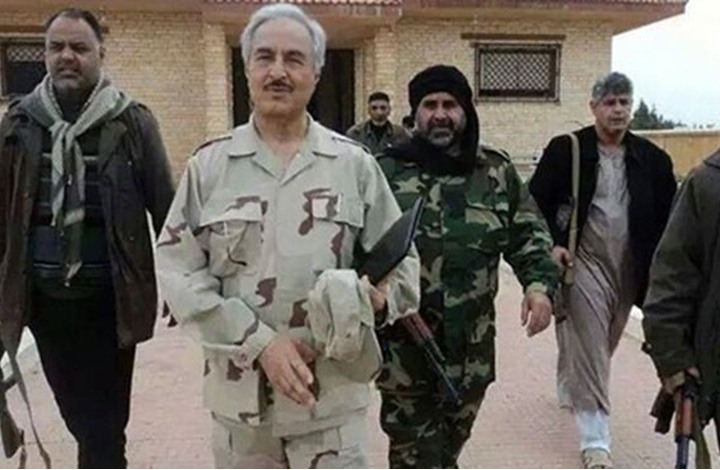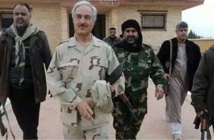Sirte, the hometown of slain dictator Moamer Kadhafi, is a stronghold of Ansar al-Sharia, classified as a terrorist organisation by the United Nations and believed to have links to IS.
Last week, jihadists released a video showing the beheading of 21 Coptic Christians in Libya, most of them Egyptian, prompting Cairo to launch air strikes on IS targets in the eastern city of Derna.
Qatar reportedly expressed reservations over the strikes at a meeting in Cairo of the Arab League, raising the ire of Egypt's delegate Tareq Adel who hit back by accusing it of supporting "terrorism".
The Gulf state responded by recalling its ambassador to Cairo for consultations.
The spat came as Libyan officials urged the UN Security Council to lift an arms embargo to allow the country's military to fight jihadists, who are spreading their influence from Syria and Iraq to the North African nation.
US President Barack Obama challenged Middle Eastern powers to stop actions that he claimed stoked the rise of IS, Al-Qaeda and other radical Islamic groups, urging them to stand up to "violent extremism".
"All of us, regardless of our faith have a responsibility to reject it," said Obama.
Most Gulf Arab nations, including Qatar, have joined the US-led coalition waging air strikes on IS in Iraq and Syria, where the jihadists have declared a "caliphate" across swathes of territory they control.
Egypt is also an ally of Washington, and a rift with Qatar and other Gulf monarchies would complicate efforts to forge a united front against IS and its affiliates across the region.
- Lawless Libya -
There is increasing concern that some rival militias battling for power and the oil wealth of lawless Libya have pledged allegiance to the Sunni Muslim extremists.
On Thursday, pictures emerged on social media of hooded gunmen in Sirte brandishing the black flag of IS on vehicles mounted with anti-aircraft guns.
Witnesses said the gunmen who seized Sirte University claimed to be IS jihadists.
The takeover came as the Islamist-backed Fajr Libya (Libya Dawn) coalition of militias that controls Tripoli and other key Libyan cities said it had sent units to "restore security in the city".
An AFP photographer who visited Sirte briefly said Fajr Libya and IS forces kept their distance from each other, and that there were no hostilities.
Libya has been awash with weapons since Kadhafi was ousted and killed in 2011. It now has two rival governments and parliaments, one recognised by the international community and the other with ties to Islamists.
- Arab rift over Libya -
On Wednesday Foreign Minister Mohammed al-Dairi appealed to the Security Council to lift an arms embargo it imposed on Libya in 2011.
"Libya needs a decisive stance from the international community to help us build our national army's capacity and this would come through a lifting of the embargo on weapons, so that our army can receive material and weapons, so as to deal with this rampant terrorism," Dairi said.
But Qatar said it wants the embargo to remain in place and expressed reservations over Egypt's air raids.
Saad bin Ali al-Mohannadi, director of Arab affairs at Qatar's foreign ministry, stressed the need for "consultations before any unilateral military action against another member state".
The ministry denounced Cairo's "tense" statement at the Arab League but said Qatar would always remain supportive of Egypt.
The six-nation Gulf Cooperation Council said it rejected "accusations by Egypt's permanent envoy at the Arab League that Qatar supports terrorism".
Ties between Doha and Cairo had been strained over Qatar's backing for Islamist president Mohamed Morsi, ousted by then army chief and now President Abdel Fattah al-Sisi in 2013.
In December, however, there was an apparent thaw when Qatar gave full support to Sisi, although Doha still shelters many leaders of Morsi's Muslim Brotherhood blacklisted by Cairo.
---------------------------------------------------------------------------------------------------------------------
Last week, jihadists released a video showing the beheading of 21 Coptic Christians in Libya, most of them Egyptian, prompting Cairo to launch air strikes on IS targets in the eastern city of Derna.
Qatar reportedly expressed reservations over the strikes at a meeting in Cairo of the Arab League, raising the ire of Egypt's delegate Tareq Adel who hit back by accusing it of supporting "terrorism".
The Gulf state responded by recalling its ambassador to Cairo for consultations.
The spat came as Libyan officials urged the UN Security Council to lift an arms embargo to allow the country's military to fight jihadists, who are spreading their influence from Syria and Iraq to the North African nation.
US President Barack Obama challenged Middle Eastern powers to stop actions that he claimed stoked the rise of IS, Al-Qaeda and other radical Islamic groups, urging them to stand up to "violent extremism".
"All of us, regardless of our faith have a responsibility to reject it," said Obama.
Most Gulf Arab nations, including Qatar, have joined the US-led coalition waging air strikes on IS in Iraq and Syria, where the jihadists have declared a "caliphate" across swathes of territory they control.
Egypt is also an ally of Washington, and a rift with Qatar and other Gulf monarchies would complicate efforts to forge a united front against IS and its affiliates across the region.
- Lawless Libya -
There is increasing concern that some rival militias battling for power and the oil wealth of lawless Libya have pledged allegiance to the Sunni Muslim extremists.
On Thursday, pictures emerged on social media of hooded gunmen in Sirte brandishing the black flag of IS on vehicles mounted with anti-aircraft guns.
Witnesses said the gunmen who seized Sirte University claimed to be IS jihadists.
The takeover came as the Islamist-backed Fajr Libya (Libya Dawn) coalition of militias that controls Tripoli and other key Libyan cities said it had sent units to "restore security in the city".
An AFP photographer who visited Sirte briefly said Fajr Libya and IS forces kept their distance from each other, and that there were no hostilities.
Libya has been awash with weapons since Kadhafi was ousted and killed in 2011. It now has two rival governments and parliaments, one recognised by the international community and the other with ties to Islamists.
- Arab rift over Libya -
On Wednesday Foreign Minister Mohammed al-Dairi appealed to the Security Council to lift an arms embargo it imposed on Libya in 2011.
"Libya needs a decisive stance from the international community to help us build our national army's capacity and this would come through a lifting of the embargo on weapons, so that our army can receive material and weapons, so as to deal with this rampant terrorism," Dairi said.
But Qatar said it wants the embargo to remain in place and expressed reservations over Egypt's air raids.
Saad bin Ali al-Mohannadi, director of Arab affairs at Qatar's foreign ministry, stressed the need for "consultations before any unilateral military action against another member state".
The ministry denounced Cairo's "tense" statement at the Arab League but said Qatar would always remain supportive of Egypt.
The six-nation Gulf Cooperation Council said it rejected "accusations by Egypt's permanent envoy at the Arab League that Qatar supports terrorism".
Ties between Doha and Cairo had been strained over Qatar's backing for Islamist president Mohamed Morsi, ousted by then army chief and now President Abdel Fattah al-Sisi in 2013.
In December, however, there was an apparent thaw when Qatar gave full support to Sisi, although Doha still shelters many leaders of Morsi's Muslim Brotherhood blacklisted by Cairo.
---------------------------------------------------------------------------------------------------------------------









 Home
Home Politics
Politics











